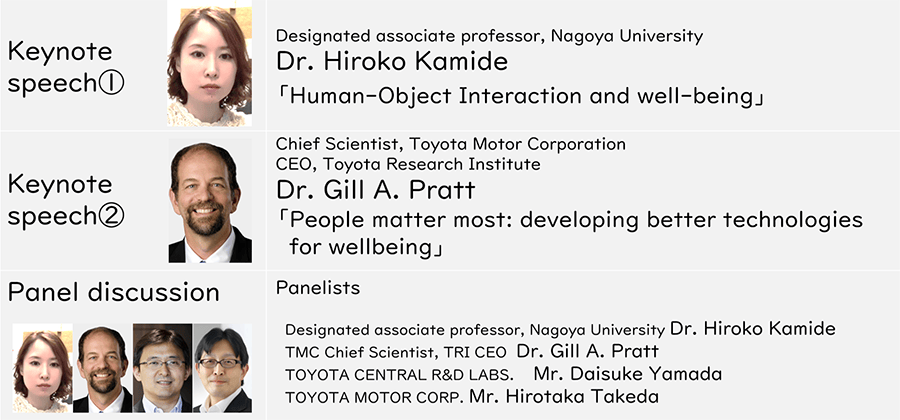Jan. 28, 2025
Well-Being from the Perspective of Responsible Research and Technology DevelopmentReport vol. 3: The Emotional Well-Being Workshop
Everyone can live happy and authentic lives. To help make this possible in the future, Toyota Motor Corporation has defined its mission as "Producing Happiness for All." It is challenging itself to create a better mobility society and community as a mobility company, in addition to car manufacturing. As part of this challenge, since 2021, researchers from the Toyota Motor Corporation Frontier Research Center, R&D and Engineering Management Div., Toyota Central R&D Labs., Inc., and Toyota Research Institute have established the "Emotional Well-Being Research Workshop" to discuss the complex questions of "What is happiness?" and "What is well-being?" from various angles. We hope to share the knowledge gained through these discussions with many people and inspire thoughts on what we can do for the future.
The 3rd research workshop theme was "Well-Being from the Perspective of Responsible Research and Technology Development."
At the first Emotional Well-Being Research Workshop, we held a discussion on "Well-Being from Diversity and Pluralism."*1 We realized that the diverse definitions of well-being for each individual contribute to the overall well-being of the group and that caring for one another is essential because of this diversity. In the second research workshop, titled "Well-being as Seen from "Play" and "Space","*2 we discovered a common structure linking the two workshops: events and games that many people can enjoy offer a space where diverse participants can engage actively. By using creativity and problem-solving skills to overcome challenges in these settings, the overall well-being of all participants can improve.
As a manufacturing company, we want to leverage the insights gained so far to develop technologies that contribute to our customers' well-being. The advancement of science and technology has enriched many people's lives and contributed to solving various social issues. Thought of in another way, we can say that science and technology have a significant impact on our daily lives. Therefore, we wanted to reflect on how our research and technology development can lead to our customers' well-being and what responsibilities we should hold in this endeavor.
For the third research workshop, we titled it "Well-Being from the Perspective of Responsible Research and Technology Development" and invited Dr. Hiroko Kamide from Nagoya University (at the time) to give a lecture. Additionally, Dr. Gill Pratt, Chief Scientist of Toyota Motor Corporation and CEO of the Toyota Research Institute, also spoke, followed by a panel discussion featuring Mr. Yamada, General Manager of Toyota Central R&D Labs, and Mr. Takeda, General Manager of R&D and Engineering Management Div., Toyota Motor Corporation. We want to share the details of that discussion.
Interaction with Objects as the Key to Well-Being
Dr. Kamide, who studies the psychological evaluation of comfort with robots and the relationship between objects and humans based on Buddhist philosophy, spoke on "The Interaction Between Objects and Humans that Contributes to Well-Being." She discussed the concept of well-being in psychology, focusing on the interaction between objects and humans.
In psychology, well-being can be understood from two perspectives: hedonism, which emphasizes the pursuit of pleasure, and eudaimonism, which values the development of mature rationality. Based on these perspectives, subjective well-being and life satisfaction are used to measure well-being. Subjective well-being reflects the degree to which individuals feel their lives are going well, and it varies depending on culture and individual differences. Dr. Kamide emphasized that what constitutes a "good state" differs from person to person, making the measurement methods crucial.
[English Translation]
Psychology of Human-Object Interaction
- Objects We Interact with Daily (Mammen, 2017)
Objects have both objective and subjective value:- Objective: practicality, price
- Subjective: personal significance, irreplaceability
- "Things come and illuminate me" (Nishida, 1965)
- Nishida Kitaro was a prominent Japanese philosopher
- This quote suggests that objects and experiences in the world around us play a crucial role in shaping our understanding of ourselves and our existence
- We gain insight when we become aware of how objects affect us
-
"Building Robots is Building People" (Mori, 2013)
- This is a motto from the Robot Contest (Robocon) in Japan
-
Human-Object Interaction (HOI) involves two interconnected aspects:
- Care: Humans treating objects with respect and mindfulness
- Learning: Objects teaching humans self-control and manners
Regarding the interaction between objects and humans, Dr. Kamide presented case reports that show how students' engagement in manufacturing through robot contests can improve well-being. The study based on the reports developed a scale to evaluate the relationship between individuals and objects (robots), demonstrating that feelings of care for objects and a sense of unity with them positively impact well-being. Specifically, those who cherish their objects tend to feel a stronger sense of unity with them and experience greater daily satisfaction. Dr. Kamide emphasized that treating objects with care fosters gratitude toward them, encourages a reevaluation of one's own values and behaviors, and that this process can enhance self-esteem, serving as a first step toward improving Well-Being.
Furthermore, she noted that insights gained from interactions with objects can cultivate a consideration for nature. By appreciating and taking care of the objects we use daily, a natural concern for the environment emerges. Such behavior not only maintains individual mental health but also contributes to the sustainability of society as a whole.
There was a new perspective and learning about how engineers can contribute to fostering rich relationships between customers and objects, which can lead to enhanced well-being and environmental consideration.
Appropriate Use of Technology Leads to a Sense of Purpose
Next, Dr. Gill Pratt spoke on the topic "People Matter Most: Developing Better Technologies for Well-Being." At the beginning, he referenced Abraham Maslow's research, noting that people's needs include safety, love and belonging, self-esteem, and self-actualization. He pointed out that these needs align with Dr. Kamide's discussion and expressed a desire to explore how Toyota can contribute to fulfilling these needs through technology.
While new technologies such as generative AI, social media, and robotics have the potential to meet people's needs, there are also concerns that they might undermine people's well-being. Dr. Pratt shared examples where technology and humans are collaborating to produce better outcomes. For instance, at a children's hospital in Boston, an AI monitoring system was implemented that helps nurses and doctors prevent medical errors, thereby improving the quality of care.
In an aging society, robots have the potential to support people's lives by enhancing their abilities and alleviating loneliness and physical limitations. It is expected that robots will not aim for complete automation but will provide the minimum necessary support while also raising people's self-esteem. For example, instead of doing all the cooking, a robot that assists with cooking can help individuals feel that they are capable of cooking on their own. It was also mentioned that robots could be accepted as family members and may help reduce loneliness.
During the Q&A session, a question was raised regarding the term "sense of purpose" mentioned in the presentation, and Dr. Pratt shared four meanings of a sense of purpose: doing what you love, receiving compensation, responding to the needs of the world, and challenging yourself for personal growth. He pointed out that engaging in activities you are good at while feeling challenged and doing something not just for yourself but also for society are important.
Understanding Objects and Well-Being Discussed in the Panel Discussion
During the panel discussion, Mr. Yamada shared a story from his childhood about how he cherishes the chopsticks given to him by his grandmother. He recalled that one day his grandmother praised him, saying, "You've become skilled at using chopsticks." This reminded him, while listening to Dr. Kamide's lecture, that taking care of objects can lead to becoming more adept at using them. Dr. Kamide pointed out that the attitude of valuing objects is based on the understanding that objects and people are partners connected on the same horizon. Furthermore, in response to the question of when an object becomes a finished product, she suggested that it is when the object becomes familiar in one's hands or when it breaks and one is able to repair it.
Mr. Takeda noted that the meaning and value one assigns to objects and events may influence well-being. In response to this observation, Dr. Pratt emphasized the importance of viewing objects and events as part of a system. For example, it is crucial to understand that products are not just provided to customers but are also offered to the social network that includes customers. By perceiving it this way, products can not only enrich customers' lives but also serve as catalytic tools that promote networks and interactions among customers and those around them.
For Next Time
In response to the theme of "Responsible Research and Technology Development," which was different from the previous two workshops, Dr. Kamide and Dr. Pratt discussed the interaction with things and the appropriate use of technology. Together, they engaged in a discussion to reexamine the relationship between technology and well-being. They expressed a desire for customers to achieve a state of well-being through technology. It was emphasized that it is essential to consider not only convenience and technological advancement but also the relationship between users and technology, as well as their feelings. This understanding is fundamental to responsible research and technology development.
As we continue these discussions with many experts, we would like to consider what Toyota can do for the well-being of people living in the society of today and tomorrow. Please look forward to the continued activities of the Emotional Well-Being Workshop.
Contact Information (about this article)
- Frontier Research Center
- frc_pr@mail.toyota.co.jp










